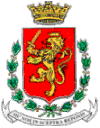San Miniato
| San Miniato | ||
|---|---|---|
| Comune | ||
| Città di San Miniato | ||

Bell tower of the Cathedral.
|
||
|
||
| Motto: Sic nos in sceptra reponis So you bring us back to power |
||
| Location of San Miniato in Italy | ||
| Coordinates: 43°41′N 10°51′E / 43.683°N 10.850°E | ||
| Country | Italy | |
| Region | Tuscany | |
| Province / Metropolitan city | Pisa (PI) | |
| Frazioni | see list | |
| Government | ||
| • Mayor | Vittorio Gabbanini (since 8 June 2009) | |
| Area | ||
| • Total | 102 km2 (39 sq mi) | |
| Elevation | 140 m (460 ft) | |
| Population (31 December 2010) | ||
| • Total | 28,257 | |
| • Density | 280/km2 (720/sq mi) | |
| Demonym(s) | Samminiatesi | |
| Time zone | CET (UTC+1) | |
| • Summer (DST) | CEST (UTC+2) | |
| Postal code | 56027 | |
| Dialing code | 0571 | |
| Patron saint | St. Genesius | |
| Saint day | 25 August | |
| Website | Official website | |
San Miniato is a town and comune in the province of Pisa, in the region of Tuscany, Italy.
San Miniato sits at an historically strategic location atop three small hills where it dominates the lower Arno valley between the valleys of Egola and Elsa. It used to carry the additional sobriquet al Tedesco ("[to] the German") to distinguish it from the convent of San Miniato al Monte in Florence, which is about 40 kilometres (25 mi) to the northeast.
In medieval times, San Miniato was on the via Francigena, which was the main connecting route between northern Europe and Rome. It also sits at the intersection of the Florence-Pisa and the Lucca-Siena roads. Over the centuries San Miniato was therefore exposed to a constant flow of friendly and hostile armies, traders in all manner of goods and services, and other travelers from near and far.
Archaeological evidence indicates that the site of the city and surrounding area has been settled since at least the paleolithic era. It would have been well known to the Etruscans, and certainly to the Romans, for whom it was a military post called "Quarto".
The first mention in historical documents is of a small village organized around a chapel dedicated to San Miniato built by the Lombards in 783. By the end of the 10th century San Miniato boasted a sizeable population enclosed behind a moat and protected by a castle built by Otto I. In 1116, the new imperial vicar for Tuscany, Rabodo, established himself at San Miniato, supplanting Florence as the centre of government. The site came to be known as al Tedesco, since the imperial vicars, mostly German, ruled Tuscany from there until the 13th century.
The first walls, with defensive towers, were thrown up in the 12th century during the time that Italy was dominated by Frederick Barbarossa. Under his grandson, Frederick II, the town was further fortified with expanded walls and other defensive works, including the Rocca and its tower.
...
Wikipedia


